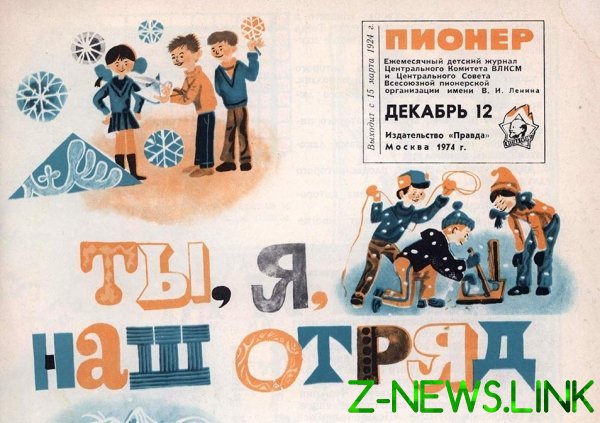
As you know, all the achievements of mankind in the XX century was made in the USSR. Where else? After all, in the Soviet Union worked 25% of all scientists of the world (or even more?). Including the best friend of all scientists, comrade Stalin. But today we will not speak. Today, we will address the problem of mankind at the threshold of the XXI century – garbage collection. Separate collection of waste today is considered a very progressive innovation. And I don’t know that such a collection was invented in the USSR in 1974. And we even know the name of the inventor. His name was Volodya Ions. He lived in Riga and was in the 7th grade. However, strictly speaking, it is only made available to the public this epoch-making invention. And came up with such a collection of garbage the President of the Council of the detachment of the 7th “B”. Don’t believe? Judge for yourself.
Here’s the letter written by Volodya Ions in the Soviet magazine “pioneer”, which was published in the 12 December 1974.
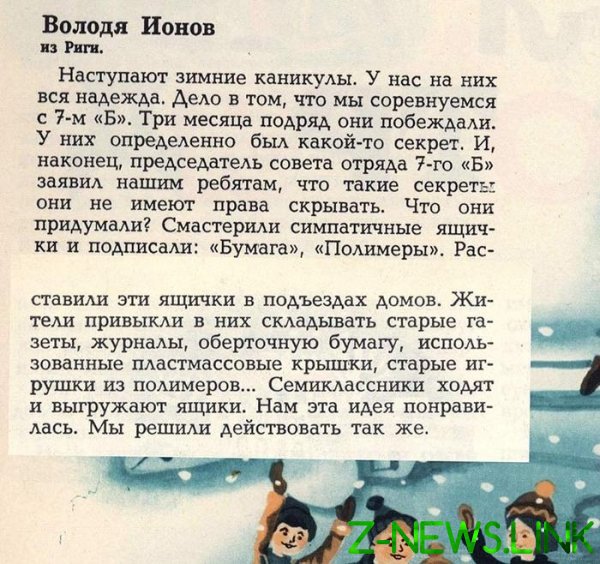
Of course, we have long been out of the pioneer age. So we know that such letters were written are not the pioneers. And they wrote the whole editions of the adult uncle who is responsible for the issue.
Similarly, we know that no Soviet mistress in their right mind would throw plastic lid – at least in a common container, though in a separate box. Because in that glorious time of the Brezhnev plastic reusable lids for cans was fierce deficit. Because if someone thought that a speech in the letter goes about the plastic caps from polutoralitrovyh bottles of Pepsi or Coke, and even beer to the Brezhnev’s USSR. It was not in 1974, of such bottles. As it was not them and a decade later. But glass jars, in which the Soviet housewife for the winter stocking up the canned goods (tomatoes, cucumbers, etc.) – was. And if in the winter you have opened 3-liter jar than to close it again? After all, content for once not eat. Here’s a special white plastic cap is reusable and will close down. And the stores are rarely sold. So Volodya Ions (and with it the staff of the Department of letters of the magazine “pioneer”) is poorly understood in the economy. Not surprisingly, in Soviet times, men did not climb in women’s Affairs, and therefore had very little idea about what’s going on in the kitchen.
Doubt that the pioneers in one of the drawers have to write “Polymers”. Though it took place in Riga, the inhabitants of which in the USSR was quoted as a very cultured people, still somehow it’s too pretentious for the pioneers. That citizen might think: this old toy that he wants to throw out – of polymers or of anything else? And when you consider that the polymer is a very broad name for different materials, then in the box “Polymers” residents could distribute the devil knows what rubbish. So uncle from the office who wanted to write something very clever, a little excited. Had to do a simple word “plastic”. It would be Soviet citizens realized. Although unlikely, there is a lot to paved. Because, as we know, the Soviet people, even the old used rods of the pens just in case kept years. Why would they have to load to the brim with his inventory a box labeled “plastics”?
And, by the way, do not understand what the pioneers of the 7th “B” was assembled polymers. I in 1974, exactly he became a pioneer. Fees paper remember. Scrap metal is also someone collected on it, I heard rumors. And polymers? A few unusual. Maybe in Riga any his know-how was. But I never heard about this.
With a box of “Paper” that’s what the ambush. Not that the Soviet citizens did not have reserves of old Newspapers. It had many subscribed to a daily newspaper. But these Newspapers they have from time to time seized other pioneers during the collection of waste paper. And one more question is open. Here, for example, any resident (or even a group of people) every morning and throw in a drawer yesterday’s paper after mailbox got new issue. In the entrance of, say, 20-30 apartments. It is, therefore, every day in this box are several dozen Newspapers. Especially when you consider that many subscribed to several different Newspapers. That is, strictly speaking, every day is typed in a bunch of old paper. Where to put it? Every day the pioneers from every entrance this bag was taken? Dozens of packs, if you take in the scale of only one street. And if the fence of drawers was once a week, there weren’t small packs, and a thick Pachisi. Under the weight of the poor seventh graders had to bend in half. And where carried? To school? And where? The school is not receiving salvage. There are no special areas under mountains of paper and “polymers”. Or every pioneer home was dragged to every six months, to bring it to school during the collection of waste paper? So the parents were probably not thrilled with this idea. In Soviet homes and your stuff enough to even attach the broken polymers from other people’s porches.
Well, another small question. Why, in fact, Volodya ions such high hopes was just on winter break? During the winter holidays the number of waste paper and polymers increased? Not a fact. Wrapping paper is probably in fact add up. Champagne corks, once again, would like something a little to diversify the contents of the box “Polymers”. What else? In General, at this point Vladimir Ionov was too optimistic.
And anyway, something tells me that the Chairman of the unit of the 7th “B” Volodya lied about these boxes, to make fun of him. Because at first glance, the idea really interesting, but if you dig deeper, it is unrealizable. At least the forces of the pioneers of the 7th “A”. It today-that the whole of the cleaning companies are implementing from scratch. Where then were the pioneers.
But overall, still, the idea of separate garbage collection was invented in the USSR in 1974, that is 45 years ago. The whole edition of the magazine “pioneer” came up. However, a little flawed. But the pioneers took on a winter vacation. And take them needed, for although today, other citizens and write about terribly interesting pioneer youth in the Soviet Union, it turns out that many pioneers in 1974 on winter break bored. And bored from loneliness. Here shows the Light Popova from Klimovsk high school:
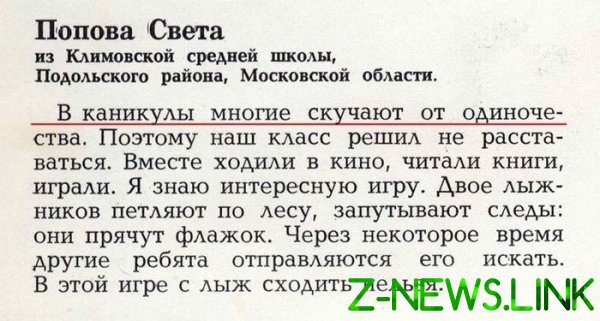
The game is certainly very interesting. And yet the fact remains that in 1974 many of the pioneers missed you alone. And, apparently, it was so common that the editors of the all-Union magazine “pioneer”, which had a circulation of 1.5 million copies, has published this letter. I, by the way, that memorable winter of 1974/ 75 gg really was all alone. Since that summer, we moved to a new area. Old friends remained on the Arbat. The new has not yet appeared. Really can not say that I was bored. I do, by the way, the child is not bored when left alone – I had a lot of interest. But other pioneers alone, it turns out, was bored.
Say – Christmas trees will not be bored? But Dima Romanov from Solnechnogorsk do not agree with you. Here is what he writes (and publishes editorial in the same December issue for 1974):

Here and so. Tree is, and fun is no reason. And all because they do not have to be a spectator and musketeer. And do not argue with Dima Romanov. The Musketeers, as everyone knows, has always been cheerful and happy.
Of course, the real pioneer not only has fun, but also brings the fun to others. Especially if it’s the pioneer boy scout. For example, offer Marina’s Cousin.
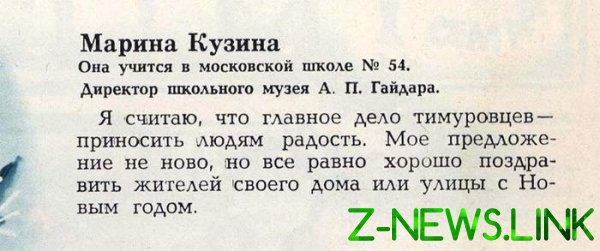
Interesting. This proposal, however, something vaguely reminiscent of children’s parties of the capitalist countries on Halloween. There are, however, kids collect candy. And the pioneers-the young volunteers congratulated people for nothing. However, judging by the fact that you could not hear about such acts of do-gooders, probably the beginning of Marina’s Cousin lost in vain. But her letter read one and a half million of pioneers.
But girls that don’t miss about living alone.
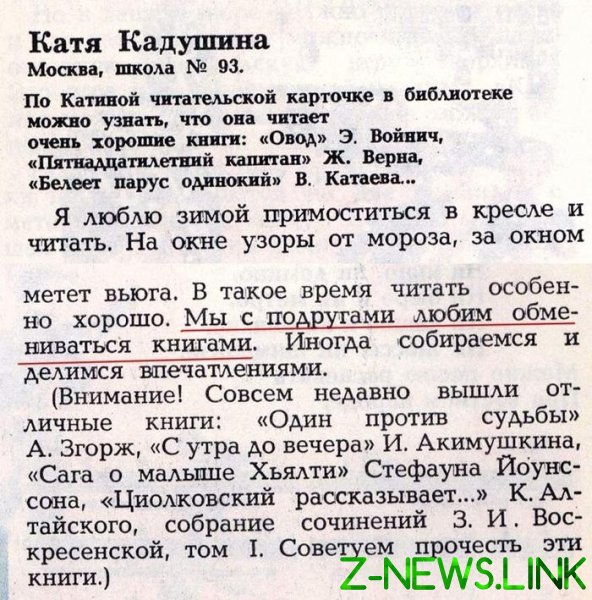
Warmly written. Just want to Nestle into the couch with a good book in hand, and to the window patterns from the cold, and the window – a Blizzard. Yes, our Moscow 2020 of frost and Blizzard can only dream about. The shower is not the law – and that is good.
By the way, pay attention to this phrase from the letter of Katy Cadusina: “my friends and I love to share books.” After reading this sentence, one realizes that, first, girlfriend Katie also love to read a good book, as well as Katya herself. And, secondly, the book deficit in the Soviet Union was a phenomenon so obvious and trivial even for kids that the magazine wrote about him not steaming, how about for granted. “We love to share books.” Right, you’ve got one good book, a friend is another. Changed and read. And on the other, sometimes in the USSR to get access to the interesting book it was impossible. Neither in the store nor in the library. Only with a friend. Here and loved friend to share. The truth about the silent Katya – their parents certainly didn’t like that. Adult Soviet citizens did not like when their children give them to someone read a good book. Because in Soviet Union people loved to not only read a good book, but to close it forever. Therefore, by the way, the exchange removed the problem. You give me back my book, then I’ll give you back yours. Had an incentive to return.
But what I don’t understand. Where in the magazine “pioneer” reader’s card of Katy Cadusina? Kate sent this card along with a letter? And where she got it from? In the library stole? Or revision sent to local business one of its members, that looked at in the library reader’s card, Kathy.
And it is that two times not to rise – pay attention to the books that Kate reading. Jules Verne, Ethel Voynich, Valentin Kataev. Books are really good. It would probably fit Alexander green, his “Scarlet sails”. But books about pioneers-heroes in the card reader Kati is not detected (otherwise, the editorial mentioned them). All right. No sane Soviet pioneer Brezhnev did not read all this propaganda crap about the pioneer heroes and other Nude. But books about travel – and, notice, travel from the past, pre-revolutionary life at the time. That’s been set up pioneers-romance, which was boring alone (pioneers neoromantiki do not read anything, so missed).
By the way, the editors of the magazine “pioneer” also does not consider it necessary to recommend anything Communist-preachy, and advised to read a book Antonin Zhorga “One against the fate” which is subtitled “the Story of the life of Ludwig van Beethoven”.
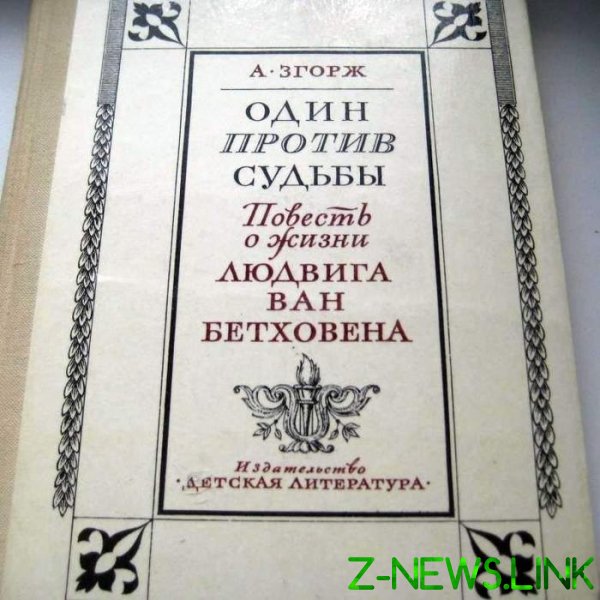
Again pay attention that the Soviet pioneers of Brezhnev times were not interested in Marxist-Leninist stuff. But the book about romance of the XIX century – it was almost the most popular Soviet children’s book that was officially available.
By the way, if anyone is interested, the second in the list of recommended literature is again not the story of Pavlik Morozov, a “morning to evening” by the famous Soviet biologist Igor Akimushkin.
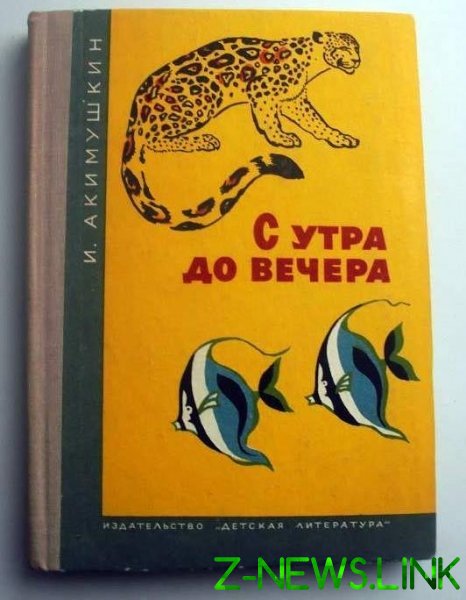
In his book for children Akimushkin in an entertaining manner tells the world about the animals of the day. And a lot – about different exotic animals from other countries and continents. He has a sequel to “From the evening until morning” is about nocturnal animals. And again don’t need to be a major child psychologist to understand that Soviet children though and didn’t understand what was locked forever in one of the Soviet Union, but they are subconsciously attracted to these other “countries and continents”. Well, at least for the study of the life of leopards, hippos and other sperm whales. And even the editors of the journal pioneer wasn’t trying to blow the other way.
In General, it’s funny sometimes to see some old Soviet children’s magazines. Notice some things that I was not paying attention. But enough for today.
In the final, another letter.
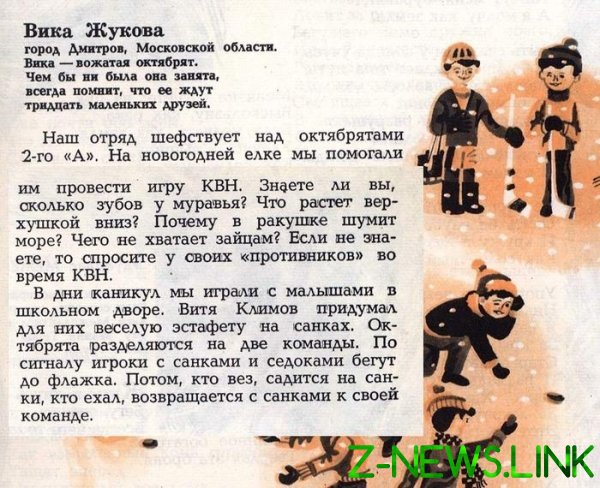
You know, there’s a type of people, which I ironically called “the Witnesses of a Great Past”. For the most part it is very limited people. Completely down maybe not so much, but in General, stars in the sky is not enough. And here is my nadooshan they’re always a leader and trying to tell some ridiculous stories about how supposedly good the Soviet Union was. And some real simple and obvious things they do not understand or do not see. Of course, the USSR wasn’t all bad. Of course, there were good things and phenomena in the USSR.
One of such phenomena is reflected in the letter Vicki Zhukova. In Soviet times there was such a thing as patronage of the senior over the Junior. Even if it sometimes was of a formal nature, let often been emasculated and often replaced with the contents (Soviet formalism). But sometimes was sincere, kind. This is best reflected in the wonderful film Ilya Freza “Freak of the Fifth B”. Or here so, in simple words, as in this letter.
In my opinion not in a false “caring for veterans”, but in such a care the older children the younger ones have something called the link between generations. And ultimately this leads to the fact that many are indifferent to each other people, who happened to be living in the same area, there is a single nation. And it’s the good things that happened in the USSR and the fact that today we have lost. I hope not forever.
© 2020, paradox. All rights reserved.





